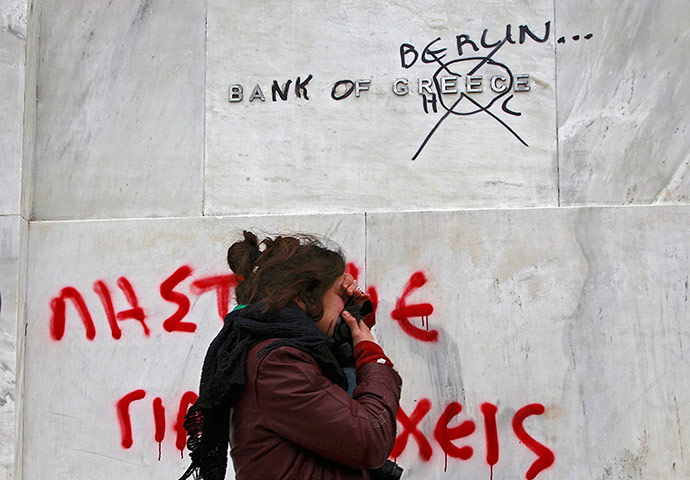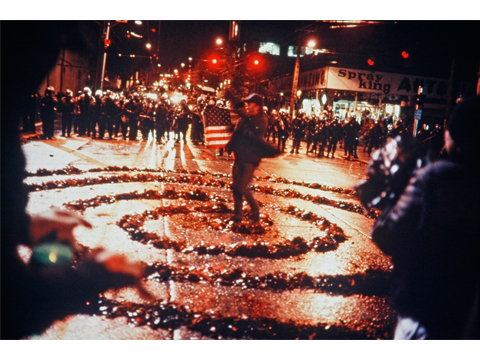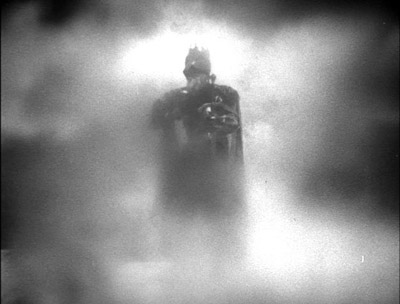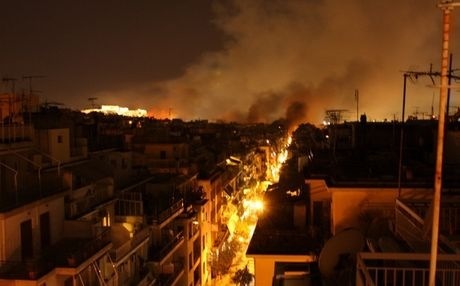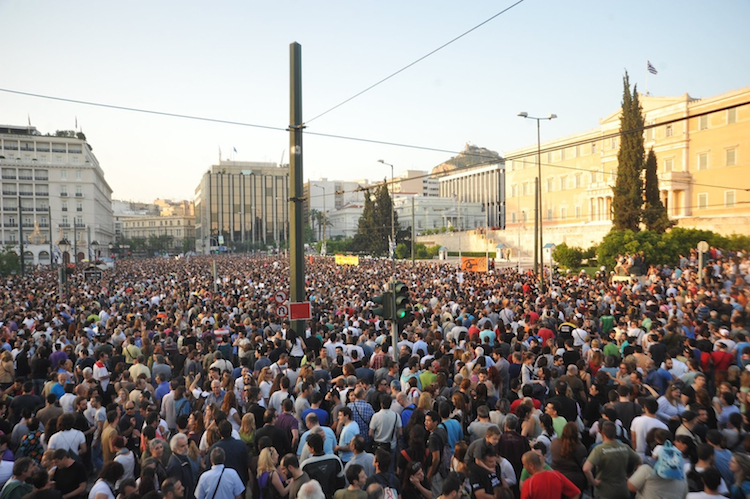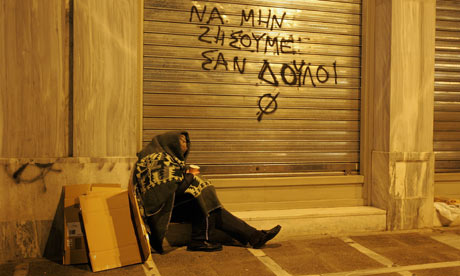Poet–How goes the world?
Painter–It wears, sir, as it grows
Shakespeare, Timon of Athens, I i.
Exit the ghost of Europe, pursued by teargas. A year after the self-styled “father of Egypt” was driven out, the Greek revolt saw the return of the spectre of global justice– and it has been driven offstage with teargas.
It has been known for some time that, in the words of Jacques Derrida, “haunting would mark the very existence of Europe,” a place designated by the “joining” of the ghost of Hamlet’s father and the spectre of Communism. Speaking in 1993, in response to the question “Whither Marxism,” Derrida appropriated Hamlet: “the time is out of joint.” As we ask, too insistently, “whither Occupy?” it might be good to linger a while in the place of the revenant. In that disjointed time we wait:
everything begins by the apparition of a specter. More precisely by the waiting for this apparition.
 Allan Sekula, Waiting for Teargas
Allan Sekula, Waiting for Teargas
In 1999, the photographer Allan Sekula was in Seattle, covering the global justice demonstrations that shut down the G20. He was at 16 Beaver last night revisiting the project, with its haunting title: Waiting for Teargas. At once this evokes Beckett, whose Waiting for Godot I have already had cause to remember, and Walter Benjamin’s sense that the most modern place of all is the waiting room. Sekula recalls:
In photographing the Seattle demonstrations my working idea was to move with the flow of protest, from dawn to 3 a.m. if need be, taking in the lulls, the waiting and the margin of events. The rule of thumb for this sort of anti-journalism: no flash, no telephoto lens, no gas mask, no auto-focus, no press pass and no pressure to grab at all costs the one defining image of dramatic violence.
[my emphasis]
The waiting is a space in-between, a time out of joint. There’s so much happening and yet so little action in this photograph. A protestor displays the US flag at the heart of a miniature recreation of Robert Smithson’s Spiral Jetty, the legendary Earthwork of the 1970s. The gesture reminds us at once of the role played by forest activists and tree sitters in the Seattle protests, those who were used to direct action to defend the old-growth Pacific Northwest; and the soundtrack that Sekula reminds us was to come, Jimi Hendrix’s version of the national anthem, played over someone’s boom box, as the tear gas blew. Notice that the shop in the top right is actually called “Spray King.” And on the horizon, the cops, waiting.
In Athens yesterday, the tear gas blew into the Greek parliament from Syntagma (Constitution) Square. The Prime Minister Papademos demanded the sacrifice of Abraham, meaning that the son must die for the father. Or rather it was Papa Demos, the father of the people/demos, claiming the place of the sovereign, the place of the specter, even as he was tear gassed:
for the king occupies this place, here the place of the father, whether he keeps it, takes it or usurps it
(Derrida)
This new hauntology reconfigures all hitherto existing versions of Hamlet. Now we can understand that Hamlet tear gassed his father all along, in resistance to patriarchy:
It avails him little. By the play’s end, he has captured the conscience of the King but in so doing suicides himself and his friends, for patriarchal vengeance is nuclear. The Treaty has been signed: but it now awaits the approval of the German Bundestag. For in saving itself, providing for its own autoimmunity, Europe has ended. It is now an occupation.
So it is fitting that we ask the question: where does a bankrupt nation like Greece get the money for so much tear gas? And find that the answer is: Israel.
Or, to be more specific: US-made tear gas, delivered to Israel and then re-exported to Greece. It comes from a plant in Jamestown, Pennsylvania, manufactured by a company called Combined Tactical Systems-CSI. The company flies US and Israeli flags outside its buildings, just in case you missed the point. Occupy activists have already been protesting the use of this product in Palestine, and discovered that $1.85 million of tear gas was paid for by the federal government and delivered to Israel. No doubt it was easy enough to spare the 4600 units requested by Greece.
There were many spectres in the square yesterday. The present is out of joint.
The present is what passes, the present comes to pass, it lingers in this transitory passage, in the coming-and-going, between what goes and what comes, in the middle of what leaves and what arrives.
Ein Gespenst geht um in Europa–das Gespenst des Kommunismus.
Take a deep breath.

